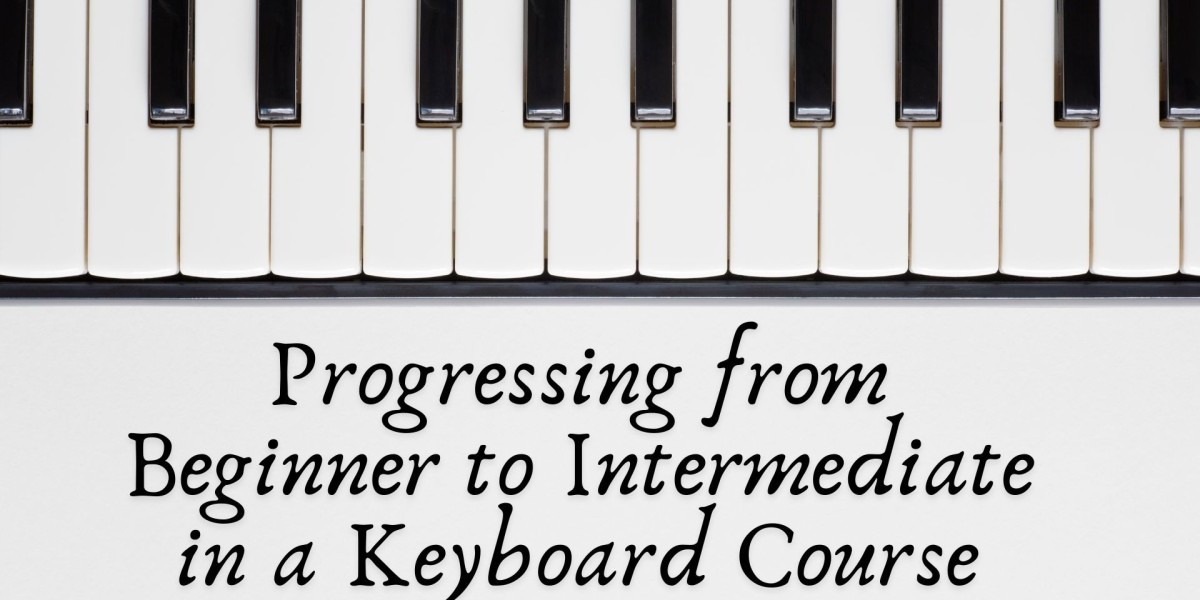Learning to play the keyboard can be an exciting journey, but for many students, the progression from beginner to intermediate can be one of the most challenging stages. As a beginner, you’ve likely learned the basics: proper posture, hand positioning, a few simple scales, and perhaps even some basic songs. But as you advance, the skills required become more complex. Moving from a beginner to an intermediate level demands practice, patience, and a structured approach to building on your foundational knowledge.
This article will explore the essential steps to help you progress from a beginner to an intermediate player in a keyboard course. It will cover the necessary skills, techniques, and mindset needed to make this transition smooth and enjoyable.
Mastering the Fundamentals
As you move past the initial beginner stage, it’s essential to keep refining the fundamentals. These are the building blocks for all the advanced techniques and concepts you will learn later on.
Proper Hand Positioning and Posture
As a beginner, you’ve learned how to position your hands and sit at the keyboard. However, refining your hand posture can make a big difference as you advance. Ensure that your hands remain relaxed, with fingers slightly curved, and wrists level with the keyboard. This posture helps avoid strain and improves your playing speed and accuracy.
Sight Reading
Sight-reading is crucial for playing at a higher level. It might have been a challenge in the beginning, but by continually practicing sight-reading exercises, your ability to read and play music at the same time will improve. Start with easy sheet music and gradually increase the complexity as your skills develop.
Scales and Arpeggios
Scales are foundational exercises that build finger strength and dexterity. As you move towards the intermediate level, aim to master both major and minor scales, and practice them in different keys. This not only improves your technical ability but also deepens your understanding of musical theory, which is essential as you progress.
Understanding Musical Theory
At the intermediate level, it becomes crucial to understand the theory behind the music you are playing. While beginners may focus primarily on playing songs, intermediates start incorporating music theory to improve their musicality.
Chord Construction
In the beginner stages, you may have learned basic chords, such as C major, F major, and G major. As you move to an intermediate level, it’s essential to understand how chords are constructed. Learn about triads, seventh chords, and chord inversions. This knowledge allows you to play more complex progressions and even create your own arrangements.
Key Signatures and Time Signatures
As an intermediate player, you should be comfortable reading key signatures and recognizing the time signatures of the pieces you play. This helps you understand the structure of the music, allowing for smoother transitions between sections of a piece and enhancing your performance.
Scales Beyond the Basics
Once you’ve mastered the basic scales, it’s time to expand. Learn the harmonic minor scale, melodic minor scale, and different modes (e.g., Dorian, Phrygian, Mixolydian). These scales will broaden your musical vocabulary and help you explore new genres and styles.
Developing Technique
As you transition to the intermediate level, focus on building up your technique to enhance the quality of your playing.
Finger Independence
At the beginner level, your fingers may not be able to move independently of each other. Developing finger independence is crucial for playing more complicated passages, such as fast runs, intricate melodies, and playing both hands simultaneously with precision.
Hand Coordination
Playing the keyboard with both hands can be tricky, especially as you start tackling more challenging pieces. Practice hand coordination exercises, starting with simple pieces where each hand plays a different part, and gradually move on to more complex music.
Pedal Usage
The sustain pedal is an essential tool for creating expressive, fluid performances. As you move toward the intermediate level, it’s important to learn how to use the pedal effectively. This includes understanding when to press the pedal for smooth transitions between notes and when to release it to avoid muddiness in the music.
Expanding Your Repertoire
Now that you have the fundamentals in place, it’s time to expand your repertoire. An intermediate player will typically be expected to perform pieces from various genres and styles, including classical, jazz, pop, and even contemporary styles like rock or electronic music.
Playing Classical Music
Classical music is an excellent way to improve your technical skills and expressiveness. Intermediate-level pieces by composers like Bach, Mozart, and Beethoven will help you work on dynamics, phrasing, and developing a more sophisticated sound.
Exploring Jazz and Contemporary Styles
To become a well-rounded keyboardist, learning jazz, blues, or pop music is equally important. These genres often involve improvisation and complex rhythms, which can be an exciting challenge. Focus on mastering basic jazz chords and progressions and practicing improvisational techniques.
Transcribing Music by Ear
Another valuable skill for an intermediate player is the ability to transcribe music by ear. This means listening to a piece of music and being able to replicate it on the keyboard without the help of sheet music. It’s an excellent way to enhance your musical ear and improve your overall playing.
Setting Realistic Goals
As you progress to the intermediate level, setting achievable goals is vital for continued improvement. Progress may slow down compared to your beginner phase, but with consistent effort, you will notice gradual improvement.
Break Down Complex Pieces
If you encounter a difficult piece, break it down into smaller sections and focus on mastering one section at a time. Practice slowly, ensuring that you understand each part before moving on to the next.
Set Time for Regular Practice
Intermediate-level players need to practice regularly to maintain and develop their skills. Create a practice schedule that includes time for scales, sight-reading, new pieces, and technical exercises. Consistency is key.
Seek Feedback
Consider taking lessons with a teacher or getting feedback from other musicians. A teacher can provide guidance on technique, music theory, and your overall musical progression. They can also suggest repertoire that will challenge and help you grow as a player.
Building Confidence and Expression
One of the hallmarks of an intermediate player is confidence in their abilities. This confidence comes not only from technical proficiency but also from the emotional expression you can convey through music.
Play with Expression
As you become more comfortable with your technical skills, focus on playing with more expression. This involves controlling dynamics, phrasing, and tempo to bring out the emotion of the piece.
Perform Regularly
To build confidence in performing, try playing in front of others as much as possible. Whether it’s for family and friends or at local recitals, performing helps you overcome stage fright and gain a sense of accomplishment.
Record Yourself
Recording your practice sessions or performances can be a valuable tool for self-evaluation. Listening to recordings allows you to identify areas where you can improve and helps you track your progress over time.
Embrace the Journey
Moving from a beginner to an intermediate player is a journey that requires perseverance, practice, and passion. Don’t get discouraged by challenges or plateaus; instead, embrace the process of growth. Celebrate your milestones, whether it's mastering a new scale, completing a song, or playing in front of an audience for the first time.
As you continue to improve, always remember that learning the keyboard is not just about mastering techniques; it's about enjoying the music and expressing yourself through the instrument. Keep learning, stay curious, and have fun on your journey to becoming an intermediate keyboard player!







